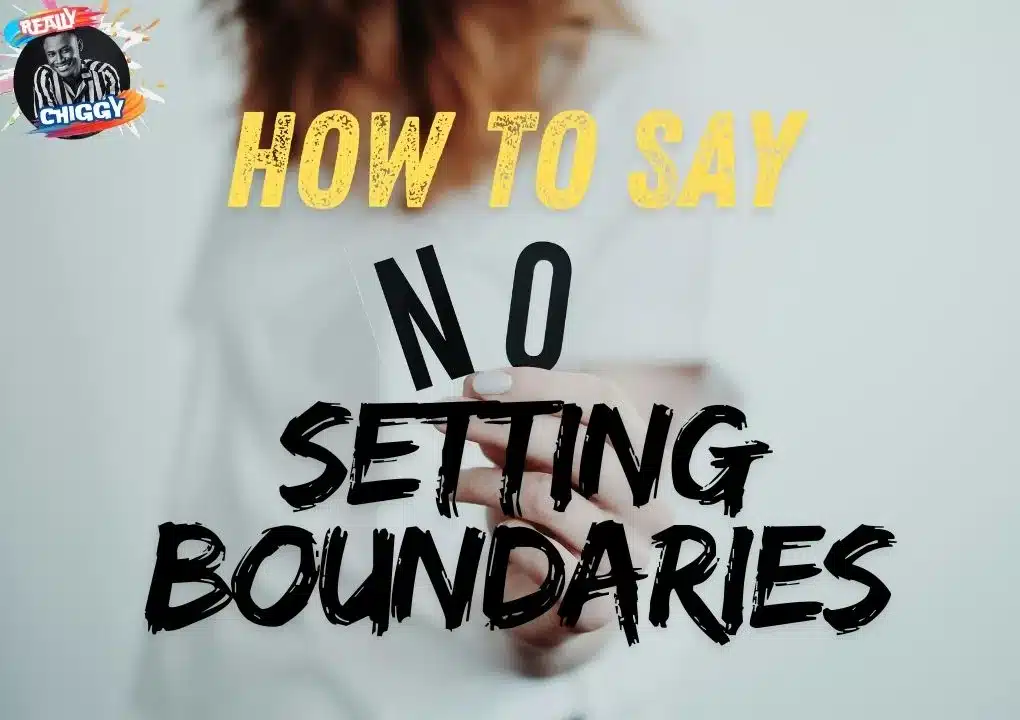The Art of Saying “No” & Setting Boundaries For Yourself
In a culture that often equates saying “yes” with being kind, capable, or dependable, the simple act of saying “no” can feel daunting—almost rebellious. We’ve been conditioned to believe that accommodating others, even at the expense of our well-being, is a virtue. But at what cost? When we stretch ourselves too thin, prioritize everyone else’s needs, and neglect our limits, we sacrifice our peace, health, and authenticity.
The art of saying “no” is not about rejection; it’s about protection—protecting your time, your energy, and your mental and emotional space. It’s about recognizing that your needs are just as valid as anyone else’s. By setting boundaries, you reclaim control over your life and ensure that your “yes” is intentional and meaningful, rather than obligatory or resentful.
ALSO, CHECK Self-Development: How To Unlock Your Full Potential In 2024
Mastering this art is not a selfish act but a profound act of self-respect. In this exploration, we’ll uncover why learning to say “no” is essential, how it empowers you to set healthy boundaries, and how, ultimately, it leads to a life of greater balance, freedom, and fulfilment.
Setting Boundaries For Yourself

Why Setting Boundaries is Crucial
In a world that constantly demands our attention, time, and energy, setting boundaries is not just an option—it is a necessity. Boundaries are the invisible lines that define where we end and others begin. They help protect our well-being, preserve our mental health, and ensure that we live a life aligned with our values and goals. Without boundaries, we risk burnout, resentment, and losing ourselves in the noise of everyone else’s needs and expectations.
Here’s why setting boundaries is crucial for a healthier, more balanced, and fulfilling life:
1. Boundaries Protect Your Mental Health
Imagine your mind as a home. Would you allow anyone to walk through your front door at any time, uninvited? Probably not. Yet, without boundaries, this is exactly what happens to our emotional and mental space.
When we say “yes” to too many demands, accommodate toxic behavior, or tolerate disrespect, we allow others to occupy our mental space. Over time, this can lead to stress, anxiety, and emotional exhaustion. Setting boundaries is like locking that front door—it allows you to decide who enters your life and under what conditions. You take back control of your energy and prioritize your mental well-being.
ALSO, READ How To Overcome Fear: 9 Simple Steps (100% Working)
For example, declining that extra work assignment when you’re already overwhelmed doesn’t make you selfish—it makes you aware of your limits.
2. Boundaries Build Healthy Relationships
Boundaries are not walls; they’re bridges to healthier, more authentic relationships. When you communicate your needs and expectations clearly, you show others how to treat you.

In relationships—whether romantic, professional, or familial—boundaries set the tone for respect. They prevent resentment from building up because you’re no longer sacrificing your comfort for others’ approval. Conversely, respecting others’ boundaries demonstrates emotional maturity and fosters trust.
For instance, letting a friend know you’re unavailable to answer calls during work hours sets a clear, reasonable boundary. It doesn’t mean you don’t care; it means you value both your time and theirs.
Healthy relationships thrive on mutual understanding, and boundaries help nurture that balance.
3. Boundaries Empower You to Focus on What Matters
Time and energy are finite resources. If you give them away freely, you’ll have little left for your passions, goals, and priorities. Boundaries help you determine what truly deserves your attention and what doesn’t.
By saying “no” to distractions, people-pleasing, or tasks that drain you, you’re actually saying “yes” to yourself—your growth, your ambitions, and your peace of mind. Setting boundaries creates space for the things that truly matter.
Consider this: Would you rather spend your time overcommitted to things that don’t align with your values or invest it in relationships, hobbies, and work that inspire you? Boundaries help you choose purpose overpressure.
4. Boundaries Reinforce Your Self-Worth
The act of setting boundaries is, at its core, an expression of self-respect. It’s declaring, “I matter. My time, feelings, and needs are valid.”
When you enforce boundaries, you acknowledge your worth and refuse to settle for less than you deserve. You stop seeking external validation and start validating yourself.
For example, leaving a toxic work environment, stepping away from draining friendships, or demanding fair treatment in your relationships is not being “too much” or “too sensitive”—it’s honouring your value as a person.
The more you practice setting boundaries, the more confident and grounded you become in who you are.
5. Boundaries Prevent Burnout and Resentment
Without boundaries, you run the risk of overextending yourself—at work, at home, and in life. Many people push their limits out of fear of disappointing others or being perceived as “lazy” or “unhelpful.” But the cost is high: burnout, resentment, and physical exhaustion.
Overcommitting can leave you feeling drained and bitter, even toward the people you care about most. Setting limits, on the other hand, allows you to show up as your best self because you’ve protected your capacity to give.
For instance, taking a mental health day when you’re overwhelmed ensures you recover rather than collapse under pressure.
How to Start Setting Boundaries
If you’ve spent most of your life saying “yes” when you wanted to say “no,” setting boundaries may feel uncomfortable at first. That’s normal. Here are a few practical steps to begin:
- Identify Your Limits: Reflect on what makes you feel drained, uncomfortable, or disrespected. These are areas where boundaries are needed.
- Communicate Clearly: Express your needs calmly but firmly. For example, “I can’t take on this project right now” or “I need time alone to recharge.”
- Be Consistent: Enforce your boundaries even if others push back. Consistency shows that you take yourself seriously.
- Prioritize Self-Care: Remember that boundaries are about protecting your peace, not punishing others.
- Let Go of Guilt: Setting boundaries isn’t selfish—it’s essential. You can’t pour from an empty cup.
At its heart, setting boundaries is about choosing yourself—your peace, your time, and your energy. It is one of the most profound acts of self-love and self-preservation.
When you set boundaries, you take back control of your life. You become the architect of your relationships, your work, and your happiness. You teach others to respect you because you respect yourself.
So, start today. Reflect on where you need boundaries and have the courage to set them. Your future self will thank you for it.
Unveiling Your Values: The Foundation of Boundaries
Before you can effectively say “no,” you need to understand what truly matters to you.
- Conduct a Values Assessment: Take some time to reflect on your core values. What’s truly important to you? Is it family time, personal growth, creative pursuits, or community service?
- Consider these questions: What activities bring you joy and fulfilment? What kind of person do you want to be? What legacy do you want to leave behind?
- Tools like personal mission statements or values clarification exercises can be incredibly helpful in this process.
- Aligning Actions with Values: Once you’ve identified your values, start aligning your commitments with them. Ask yourself: “Does this activity or commitment align with my values?” If the answer is no, it’s time to reconsider.
Mastering the Art of Assertiveness
Assertiveness is key to effective boundary setting. It’s about communicating your needs and boundaries clearly and respectfully.
- “I” Statements: Use “I” statements to express your feelings and explain your limitations. For example, instead of saying “You always ask me for favours,” try saying, “I’m feeling overwhelmed right now and won’t be able to take on any new commitments.”
- Body Language and Tone of Voice: Your body language and tone of voice play a crucial role in assertive communication. Maintain eye contact, speak calmly and confidently, and use a firm but respectful tone.
- Practice Makes Perfect: Assertiveness is a skill that takes practice. Start with small steps and gradually increase the difficulty.
The Power of Delegation
Don’t be afraid to delegate tasks when possible. Whether it’s at work or at home, learn to share the load and ask for help.
- Identify tasks that can be delegated: Are there any chores, errands, or projects that you can delegate to family members, colleagues, or even virtual assistants?
- Empower others: When you delegate, provide clear instructions and trust others to complete the task.
Saying “No” with Grace and Empathy

It’s possible to decline requests without being rude or hurtful.
- Empathy is Key: Acknowledge the other person’s feelings and perspective. For example, you could say, “I understand how important this is to you…”
- Offer Alternatives: When possible, offer alternative solutions or suggestions. For example, you could say, “I can’t help with that right now, but perhaps I can assist you with [alternative suggestion].”
- Practice Different Phrases: Experiment with different phrases to find what works best for you. Some examples include:
- “Thank you for thinking of me, but I’m not able to take on that project right now.”
- “I’d love to help, but I have other commitments at this time.”
- “I’m happy to support you in other ways, but I’m not able to [specific request].”
Overcoming Common Challenges
Setting boundaries can be challenging. Here’s how to overcome common obstacles:
- Conquering the Fear of Missing Out (FOMO): It’s natural to worry about missing out on social events or opportunities when you say “no.” However, remember that saying “no” to some things allows you to say “yes” to the things that truly matter.
- Addressing Guilt and Self-Blame: It’s important to be kind to yourself as you learn and practice setting boundaries. Don’t beat yourself up if you slip up or feel guilty.
- Handling Guilt-Tripping Individuals: Some people may try to manipulate or guilt-trip you into saying “yes.” Learn to recognize these tactics and respond assertively without getting drawn into an argument.
The Long-Term Rewards of Setting Boundaries
The benefits of setting boundaries extend far beyond stress reduction.
- Improved Mental and Physical Health: When you prioritize your well-being, you’re more likely to experience reduced stress, improved sleep, and increased energy levels.
- Stronger Relationships: Setting healthy boundaries can strengthen your relationships by ensuring that your needs are met.
- Increased Self-Confidence: Learning to assert yourself and prioritize your well-being can significantly boost your self-esteem. You’ll feel more confident and empowered, knowing you’re in control of your own life.
Setting boundaries is an ongoing process. It takes time and practice to master this skill. But by consistently prioritizing your needs and communicating your boundaries effectively, you can create a more fulfilling and less stressful life.
Remember: Saying “no” is not selfish. It’s an act of self-care.
Call to Action:
- Share your thoughts: What are your biggest challenges when it comes to setting boundaries?
- Subscribe to the channel: For more tips and strategies on personal development.
- Challenge: Start practising setting boundaries today! Identify one situation where you can confidently say “no” and see how it feels.
Conclusion
At its heart, setting boundaries is about choosing yourself—your peace, your time, and your energy. It is one of the most profound acts of self-love and self-preservation. When you set boundaries, you take back control of your life. You become the architect of your relationships, your work, and your happiness. You teach others to respect you because you respect yourself. So, start today. Reflect on where you need boundaries and have the courage to set them. Your future self will thank you for it.
KINDLY FOLLOW MY YOUTUBE PAGE FOR VISUALS
